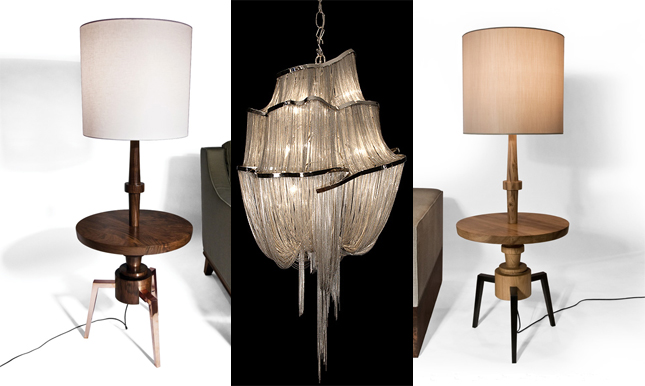Barlas Baylar and Atlantis
Elegant lighting from a dream of the future.
With its four miles of nickel chain, Barlas Baylar has created the Atlantis Chandelier out of draped metal while managing to keep almost everything looking as if it were made from fabric. Wishing to subvert traditional notions of metal, the famous New York City furniture designer has redefined what is possible with the material, conjuring soft sensuality where hard reality had prevailed, and trading coolness for warmth. For what is most striking about his Atlantis chandeliers is the wonderful sensory dissonance they engender at first sight: is it soft? Is it hard? What is it? A chandelier. Our minds tell us that metals are hard and cold, not warm and sensuous. The only concession Baylar has left our memories is the familiar quality of metal’s inimitable luster. But the Atlantis’ flowing organic forms still puzzle us, even as we become admirers upon recognizing its artistry and craftsmanship, lingering in the mind as an uncanny experience.
And thus has Baylar achieved a fervent following among upscale interior designers, with preternatural conceptions that arrest viewer attention and seduce the senses. And to walk through his showrooms at Hudson Furniture, the company he founded to promote his vision of natural organic elements in harmony with minimalist aesthetics, is to tour a world where stone, wood, and glass has been re-imagined as utilitarian art that blend form and function, style and substance – in a word, furniture.
But not just “furniture,” as his Atlantis chandelier has so beautifully testified. More than furniture, and even more than art, Baylar’s works suggest nature herself, to such an intense purity of vision that even a chandelier made entirely out of manufactured materials can persuade us that it is organic, not assembled. Keenly aware of the functional elements of design, Baylar has tamed the interplay between light and form to bring forth the personal epiphany that is his Atlantis chandelier, which should be seen from all angles to be best appreciated. Variously described as a necklace of light, a jellyfish, and, even more whimsically, a metal fruit, his Atlantis chandelier can evoke emotions to suit any mood, any occasion. Bold and unconventional but never out of place, it’s easy to imagine these unusual ice-breakers and conversation-starters in almost any setting, from the sublime to the subterranean. One wouldn’t think so, given these chandeliers’ unusual, even if beautiful, appearance, but it is precisely because they are so out-of-the-ordinary that our prejudices would not know where to properly place them – and thus widely accept them as they are, wherever they’re found.






